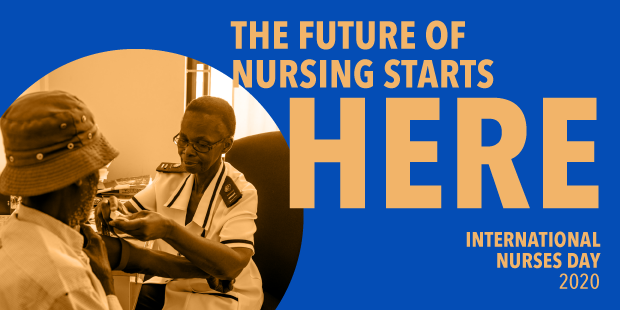Where We Work
See our interactive map


Irine Chelag’at Birir tells us how the pandemic is changing work for her and her fellow nurses.
Irine Chelag’at Birir is a nurse in Namibia. We asked her to tell us more about her job, including how COVID-19 is affecting work for her and her fellow nurses in the country.
Here’s what she told us.
I grew up in a remote village in Kenya. My neighbor’s daughters were nurses and I admired the way they came home in uniform.
When I received my acceptance letter from the nursing school, I was so happy, I was over the moon. The joy couldn't be described. I was admitted in one of the best nursing schools in Kenya and I was so happy.
When I started, I thought nursing was just holding a needle and injecting it, but it’s so much more than that. I’ve learned so much about the diversity of nursing.
For me, nursing and midwifery is not just a profession, it’s a calling. Nurses attend to people who need help when no one else will. They sacrifice their sleep, listen to people’s stories, and attend to extremely sick people, including those with highly infectious diseases. The same person opens the eye of a newborn and closes the eyes of a dying person with dignity.
Nurses are trained for emergencies like COVID-19. I am privileged to have gotten all the knowledge from the training school, the experience having worked for several years, as well as the frequent updates provided by the IntraHealth national office.
I started working as a nurse in Kenya immediately after I graduated, and then was placed in Lesotho in 2008. I was in a facility delivering antiretroviral treatment services. It was new for me. I didn’t know much, and I had to learn at work, very fast. Then in 2016, I moved to Namibia. Working in different places prepared me for whatever happens, and when a situation like this comes, nurses gets continuous updates on how to handle it.
I work as a nurse mentor for IntraHealth in the Zambezi region in Namibia. Namibia is now in stage two of lockdown, which allows work and businesses to open and operate while adhering to infection prevention and control measures.
As a nurse mentor, I am responsible for providing technical support and mentoring to field workers like nurses, community care workers, and other staff. Since the outbreak of COVID-19, physical gatherings and physical contact are prohibited, and this is a challenge for me in providing onsite mentorship. However, thanks to technology, I am able to do telephonic Zoom meetings, phone calls, and other non-contact mentorship.
As a nurse mentor, I am responsible for ensuring that nurses and other staff provide high-quality services for sexual health and HIV prevention to adolescent girls and young women. Since the outbreak of COVID-19, the main challenge has been to reach the girls for the services, since clients are discouraged from attending the health facilities, except in emergency cases. We are therefore calling the clients and delivering services door-to-door for those who agree. Some of them we meet in a community area where they feel comfortable, considering social distancing of one to two meters apart.
We are doing this to ensure continuity of services for clients who need family planning and HIV pre-exposure prophylaxis, or PrEP. For the clients taking PrEP, we also issue doses for a longer duration of up to six months.
I advise people to get to know everything about COVID-19. It’s my job to educate people and tell them what happens. We need to share information with them and give them disease-prevention information. We are also telling everyone, not just our clients, about what the symptoms are and what they should do. We are advising people, if possible, to stay at home.
People need to know that they should call the hotline provided by the Ministry of Health and Social Services, and ask questions before they go to a health facility, if they feel they are having COVID-19 symptoms.
Being a nurse is not easy. Nurses have families too. While everyone is advised to do social distancing, this never applies to nurses. A nurse has to be at a health facility or hospital to do what they do best, taking care of the sick, including the patients with COVID-19.
When I started nursing, I didn’t know that. There are things you aren’t prepared for in life. It’s so much more than just holding a needle and giving an injection. You must be strong. Nursing is a sacrifice.
But it’s good to be a nurse. Being in uniform connects all of us nurses, working in the ward from corner to corner, with a drug trolley. I love it so much.
Get stories from midwives and nurses around the world delivered right to your inbox: sign up for our mailing list.
And join the conversation:
#NursesLead #VoiceToLead #IND2020 #HealthWorkersCount
Get the latest updates from the blog and eNews




